1. 1 本册综合 同步素材(牛津上海版八年级下册)
上海牛津沪教版八年级(下)同步讲义unit2
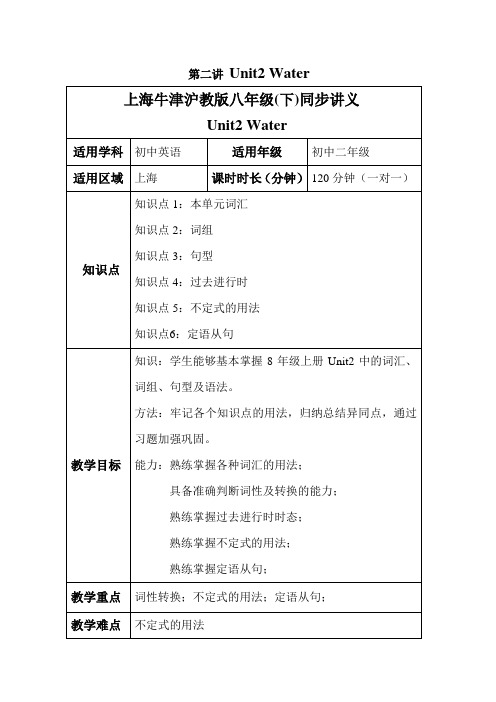
第二讲Unit2 Water教学过程一、课堂导入教师讲述一个与本节课题目有关的英文小故事,引出今日所要讲解的知识点,然后让学生简单梳理一下所涉及的问题,带着问题学习本节课的内容。
二、复习预习教师引导学生复习上节课学的重点内容,检测单词的用法,(以提问、回顾的形式进行),针对上节课的作业进行讲评、订正、答疑,并通过英文小故事导入本节课所要学习的新知识。
三、知识讲解1. 知识点一:重点单词1)daily [ˈdeɪli]【词性】adv.【词义】每天【经典例句】Your body needs about two litres of water daily.你的身体每天需要两升左右的水。
2)amount [əˈmaʊnt]【词性】n.【词义】数量;数额【易混淆点】an amount of 大量的,修饰不可数名词a number of 大量的,修饰可数名词【经典例句】When you exercise, the amount of water you need increase.当你锻炼的时候,你身体需要水的量就增加了。
3)increase [ɪnˈkri:s]【词性】v.【词义】增加【易混淆点】increase 增加decrease 减少【经典例句】When you exercise, the amount of water you need increase.当你锻炼的时候,你身体需要水的量就增加了。
4)remain [rɪˈmeɪn]【词性】v.【词义】仍然是;保持不变【易混淆点】remain 仍然是still 仍然;依旧【经典例句】The amount of water you need remains the same.你需要的水还是一样的。
5)symbol [ˈsɪmbl]【词性】n.【词义】符号【易混淆点】symbol 符号signal 标记【经典例句】The chemical symbol for water is H2O.水的化学分子式是H2O。
上海牛津版八年级下册Unit2 Water 同步讲义 原卷版
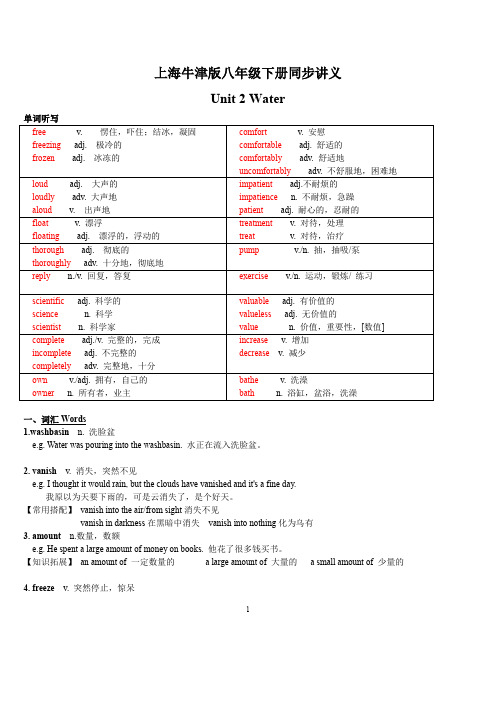
上海牛津版八年级下册同步讲义Unit 2 Water一、词汇Words1.washbasin n. 洗脸盆e.g. Water was pouring into the washbasin. 水正在流入洗脸盆。
2. vanish v. 消失,突然不见e.g. I thought it would rain, but the clouds have vanished and it's a fine day.我原以为天要下雨的,可是云消失了,是个好天。
【常用搭配】vanish into the air/from sight消失不见vanish in darkness在黑暗中消失vanish into nothing化为乌有3. amount n.数量,数额e.g. He spent a large amount of money on books. 他花了很多钱买书。
【知识拓展】an amount of 一定数量的 a large amount of 大量的 a small amount of 少量的4. freeze v. 突然停止,惊呆1e.g. Fear made him freeze in his tracks. 恐惧使他突然停止前进。
He froze in front of the audience. 他在观众面前吓呆了。
【知识拓展】freeze v. 冷冻,冷藏(食物)e.g. Not all fruit and vegetables freeze well. 并非所有的水果和蔬菜都适合冷藏。
5. impatient adj.不耐烦的,急躁的e.g. As a nursery teacher, you mustn't be impatient with the children. 作为幼儿园教师,你不该对孩子急躁。
【知识拓展】patient adj. 有耐心的e.g. She is so kind and always patient with those naughty children. 她对这些淘气的孩子们是如此和蔼、有耐心。
牛津上海版八年级下册 Module1 unit 1 同步练习题(有答案)

第一单元测试卷Part 1 V ocabulary and Grammar(第一部分词汇和语法)(共38 分)I . Choose the best answer(选择最恰当的答案):(14 分)()1. Trees are the biggest and oldest living things on the earth. Which of the following is correct for the underlined word in the sentence?A./'livig/B. /'li:vig/C. /li'vg/D. /li:'vg/()2. Which of the following underlined parts is different in pronunciation with others?A.She hardly drinks coffee, because coffee is bad for her stomach.B.Tommy enjoys playing cards with his friends at the weekend.C.The escaped prisoner was brought back under armed guard.D.I can hear him singing in the kitchen.()3. The clean water and fresh air in the countryside keep me a nd healthy.A.aliveB. livedC. livingD.live()4. Trees can protect themselves producing a chemical.A. byB. fromC. withD.in()5. Though we live in different countries, we often______ each other by phone or emails.A. communication withB. communicate withC. contact withD. communicate in()6. They are playing chess over there. Let’s go and______them.A.take part inB. attendC. joinD. join in()7. We must try our best to fight pollution.A.forB. againstC. withD. to()8. The seafood his mother cooked tasted so that everyone ate a lot.A.deliciousB.wellC.terriblyD.badly()9. As we all know, people live without oxygen.A.shouldn’tB.mayC.can’tD.can()10. Be quiet! My sister for her exam in the next door.A.preparesB.preparedC.has preparedD.is preparing()11. The water here is not mixed with anything else because it is not polluted by any industrial wastes.A.pollutedB.cleanC.pureD.dirty()12. —Shall we go out for a walk?—Sorry, I can’t. I my homework.A.didB.am doingC.doD.have done()13.Don’t make so much noise. The students________ a Chinese class.A.are havingB.hadC.haveD.were having()14. John is from Britain. He English.A.will speakB.speakC.speaksD.is speaking()15.Students will make great progress if they a subject.A.are interesting inB.are interestingC.are interested inD.are interested()16. Everyone except Jack. He is going over his lessons in the sitting room.A.are sleepingB.is sleepingC.sleepingD.sleepⅡ.Complete the following passage with the words or phrases in the box. Each word or phrase can only be used once (将下列单词或词组填入空格。
沪教牛津 初中 英语 八年级下册(八下)
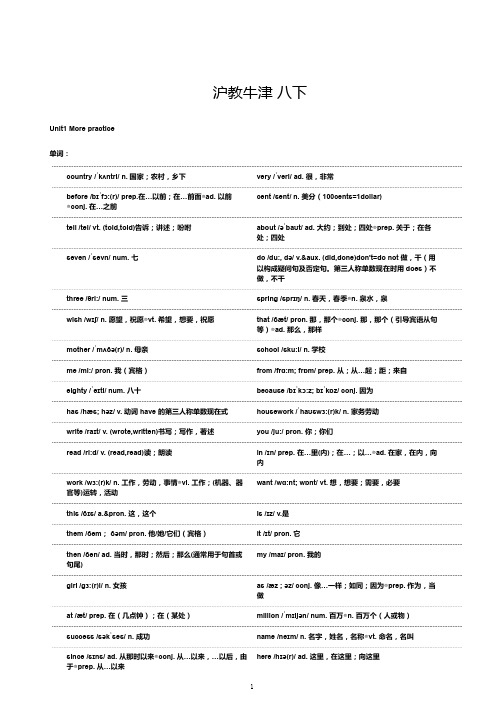
country/ˈkʌntri/n. 国家;农村,乡下very/ˈveri/ad. 很,非常before/bɪˈfɔ:(r)/prep.在…以前;在…前面◎ad. 以前◎conj. 在…之前cent/sent/ n. 美分(100cents=1dollar)tell/tel/vt. (told,told)告诉;讲述;吩咐about/əˈbaʊt/ad. 大约;到处;四处◎prep. 关于;在各处;四处seven/ˈsevn/num. 七do/du:, də/v.&aux. (did,done)don't=do not 做,干(用以构成疑问句及否定句。
第三人称单数现在时用 does)不做,不干three/θri:/num. 三spring/sprɪŋ/n. 春天,春季◎n. 泉水,泉wish/wɪʃ/n. 愿望,祝愿◎vt. 希望,想要,祝愿that/ðæt/pron. 那,那个◎conj. 那,那个(引导宾语从句等)◎ad. 那么,那样mother/ˈmʌðə(r)/n. 母亲school/sku:l/n. 学校me/mi:/pron. 我(宾格)from/frɑ:m; frɒm/ prep. 从;从…起;距;来自eighty/ˈeɪti/num. 八十because/bɪˈkɔ:z; bɪˈkɒz/conj. 因为has/hæs; həz/v. 动词 have 的第三人称单数现在式housework/ˈhaʊswɜ:(r)k/n. 家务劳动write/raɪt/v. (wrote,written)书写;写作,著述you/ju:/pron. 你;你们read/ri:d/ v. (read,read)读;朗读in/ɪn/prep. 在…里(内);在…;以…◎ad. 在家,在内,向内work/wɜ:(r)k/n. 工作,劳动,事情◎vi. 工作;(机器、器官等)运转,活动want/wɑ:nt; wɒnt/ vt. 想,想要;需要,必要this/ðɪs/a.&pron. 这,这个is/ɪz/v.是them/ðem; ðəm/pron. 他/她/它们(宾格)it/ɪt/pron. 它then/ðen/ ad. 当时,那时;然后;那么(通常用于句首或句尾)my/maɪ/pron. 我的girl/gɜ:(r)l/ n. 女孩as/æz ; əz/ conj. 像…一样;如同;因为◎prep. 作为,当做at/æt/prep. 在(几点钟);在(某处)million/ˈmɪljən/ num. 百万◎n. 百万个(人或物)success/səkˈses/n. 成功name/neɪm/n. 名字,姓名,名称◎vt. 命名,名叫since/sɪns/ad. 从那时以来◎conj. 从…以来,…以后,由于◎prep. 从…以来here/hɪə(r)/ad. 这里,在这里;向这里沪教牛津八下Unit1 More practice单词:other/ˈʌðə(r)/pron. 别人,别的东西◎a. 别的,另外的for/fɔ:(r); fə(r)/prep. 为了…;向…,往…;与…交换;防备…;适合…;因为…;在…期间;对于…;对…来说◎conj. 因为,由于I/aɪ/pron. 我life/laɪf/n. (复lives)生命;生涯;生活;人生;生物lot/lɑ:t; lɒt/n. 许多,好些how/haʊ/ad. 怎样,如何;多少;多么teacher/ˈti:ʧə(r)/n. 教师,教员are/ɑ:(r); ə(r)/v.是China/ ˈʧaɪnə/n. 中国and/ænd; ənd/conj. 和;又;而of/ɒv; əv/prep. (表示所属,数量,其中)…的now/naʊ/ad. 现在class/klɑ:s/,/klæs/n. (学校里的)班;年级;课a/ə; eɪ/art. 一(个、件…)one/wʌn/pron. 一(个,只…)◎num. 一start/stɑ:(r)t/v. 开始,着手;出发go/gəʊ/ vi. (went,gone)去;走;驶;通到;到达◎n. 尝试also/ˈɔ:lsəʊ/ad. 也(做某事)room/ru:m/n. 房间,室;空间;地方many/ˈmeni/ pron. (比较级more,最高级most)许多人(或物)◎a. 许多的way/weɪ/n. 路,路线;方式,手段stay/steɪ/n.&vi. 停留,逗留,呆home/həʊm/n. 家◎ad. 到家;回家the/ði:; ðə/art. 这(那)个,这(那)些(用于特定人或物,序数词,最高级,专有名词,世上独一无二事物前)special/ˈspeʃəl/a. 特别的,专门的help/help/n.&vt. 帮助,帮忙with/wɪð,wɪθ/prep. 关于;带有;以;和;用;有paid/peɪ/v. (paid,paid)付钱,给…报酬◎n. 工资thing/θɪŋ/n. 东西;(复)物品,用品;事情,事件to/tu: ; tə/prep. (动词不定式符号,无词义);(表示接受动作的人或物)给;对,向,到;在…之前age/eɪdʒ/n. 年龄;时代return/rɪˈtɜ:(r)n/ v. 归还,回,归first/fɜ:(r)st/num. 第一◎a.&ad. 第一;首次;最初◎n. 开始;开端文章:1. Success for Spring Buds2. My name is Feng Guixiang.3. I want to tell you about the China Children and Teenagers' Fund (CCTF) and how it helped me.4. One of the CCTF's special activities is the Spring Bud Project.5. In 1989, 4.8 million children in the country, aged from seven to fourteen, were unable to attend school.6. Eighty-three per cent of them were girls.7. Because of this, the CCTF launched the Spring Bud Project to help them.8. Since then, the project has helped millions of girls return to school.9. It has also built a lot of schools.10. The very first Spring Bud class was here in Guangxi in 1989.parent /ˈperənt; ˈpeərənt/ n. 父(母),双亲very /ˈveri/ ad. 很,非常bring /brɪŋ/ vt. (brought,brought)拿来,带来,取来paint /peɪnt/ n. 油漆◎vt. 油漆,粉刷,绘画during /ˈdjʊərɪŋ/,/ˈdʊrɪŋ/ prep. 在…期间;在…过程中three /θri:/ num. 三without /wɪˈðaʊt/ prep. 没有leg /leg/ n. 腿;腿脚;支柱offer /ˈɒfə/,/ˈɑ:fər/ n. 提供;建议these /ði:z/ a.&pron. 这些music /ˈmju:zɪk/ n. 音乐,乐曲her /hɜ:(r)/ pron. 她(宾格),她的friend /frend/ n. 朋友near /nɪə(r)/ a.近的◎ad. 附近,邻近◎prep. 在…附近,靠近because /bɪˈkɔ:z; bɪˈkɒz/ conj. 因为lonely /ˈləʊnli/ a. 孤独的,寂寞的write /raɪt/ v. (wrote,written)书写;写作,著述they /ðeɪ/ pron. 他(她)们;它们;人们in /ɪn/ prep. 在…里(内);在…;以…◎ad. 在家,在内,向内work /wɜ:(r)k/ n. 工作,劳动,事情◎vi. 工作;(机器、器官等)运转,活动want /wɑ:nt; wɒnt/ vt. 想,想要;需要,必要understand /ˌʌndə(r)ˈstænd/ v.(understood,understood)懂得;明白;理解them /ðem ; ðəm/ pron. 他/她/它们(宾格)is /ɪz/ v.是it /ɪt/ pron. 它hurt /hɜ:(r)t/ vt. (hurt,hurt)伤害,受伤;伤人感情I /aɪ/ pron. 我accident /ˈæksɪdənt/ n. 事故,意外的事lot /lɑ:t; lɒt/ n. 许多,好些are /ɑ:(r); ə(r)/ v.是have /hæv; həv/ vt. (had,had)有;吃;喝;进行;经受disabled /dɪsˈeɪbld/ a. 残废的,残疾的illness /ˈɪlnəs/ n. 疾病a /ə; eɪ/ art. 一(个、件…)one /wʌn/ pron. 一(个,只…)◎num. 一spirit /ˈspɪrɪt/ n. 精神photo /ˈfəʊtəʊ/ n. =photograph 照片many /ˈmeni/ pron. (比较级more,最高级most)许多人(或物)◎a. 许多的picture /ˈpɪktʃə(r)/ n. 图片,画片,照片the /ði:; ðə/ art. 这(那)个,这(那)些(用于特定人或物,序数词,最高级,专有名词,世上独一无二事物前)11. The Spring Bud Project paid for me to attend that class.12. It also rented a room close to the school for me.13. Before the project started, I stayed at home and helped my mother with the housework.14. Going to school changed my life.15. I learnt to read and write and do many other things.16. Now I work as a teacher at a Spring Bud school here in Guangxi.17. I wish to help other girls the way the Spring Bud Project helped me.Unit1 Reading 单词:call/kɔ:l/n. 喊,叫;电话,通话◎v. 称呼;呼唤;喊,叫help/help/n.&vt. 帮助,帮忙meet/mi:t/vt. (met,met)遇见,见到◎n. 会;集会to/tu: ; tə/prep. (动词不定式符号,无词义);(表示接受动作的人或物)给;对,向,到;在…之前story/ˈstɔ:ri/n. 故事,小说but/bʌt; bət/conj. 但是,可是◎prep. 除了,除…外use/ju:z/vt. 利用,使用,应用tell/tel/vt. (told,told)告诉;讲述;吩咐do/du:, də/v.&aux. (did,done)don't=do not 做,干(用以构成疑问句及否定句。
八年级英语下册 Chapter1(France is calling)同步练习1 上海牛津版 试题

Chapter 1 France is calling一. Complete the sentences with proper words according to the given descriptions in the brackets.(根据括号中所给的单词释义,用适当的单词完成下列句子。
)1. Anderson goes a ______(to another country)for her holidays every year.2. There is not much a ______(connected with farming)land in Hong Kong now.3. Washington D.C. is the c______(the most important city of a country, where the government is)of the United States of America.4. The king built many c_________(big buildings usually from hundreds of years ago which are very strong, to keep your enemies out)to control the country.5. Rice and soya beans are main c______(plants grown for food or for a product)6. What is the d______(the place which you are travelling to )of that minibus ?It is going to Shanghai Stadium.7. This umbrella e______(allows somebody to do something, makes able/ possible)me to stay dry in the rain.8. There is a h_______(very big)amount of work still to be done.9. Charlie Chaplin had a big i_______(effect, power to change someo ne’s ideas)on films.10. Big Ben is one of the l_______(famous places, places which help you find your way if you are lost)on London’s skyline.11. His n______(friendly or funny name )is ‘Fatty’ because he always eats.12. She is responsible for the organization in the London r______(area, part of a country ).13. This pen always r______(helps or makes someone remember something)me of Rome, because I bought it there.14. The coach will take you through the most s_______(having good scenery and views, good to look at)parts of Beijing.15. I shall remember that happy day f______(for all time, always).16. I o_______(said or showed that you would do or give something if another person wanted it )to help her.17. London has many a______(something that people like and feel interested in), such as Big Ben and Buckingham Palace.18. She is studying the c______(arts, ideas and way of life of a group of people )of the American Indians.二.1.Sydney is our final ______(destination, departure).2. The _______(world, world’s )population was about 1,700 million at the beginning of the twentieth century.3. There is nothing ______(farther, further)to be said.4. She was ______(amazed, amazing)that he could finish the work in only ten minutes.5. Sally has been in china for five years, so she ______(has got used to, has used to )theChinese food.6. What you said______(reminds, remembers )me of last year.三. 完形填空Nearly everybody enjoys chicken, and the most famous name in chicken is Kentucky Fried Chicken. Mr Sanders, the man who started this ___1___ was not always very rich. At one time, he ___2___ a small gas station next to a highway(公路). Many truck drivers ___3___ there to get gas and take a rest. Mr Sanders realized they were often ___4___, so he began serving sandwiches and coffee. ___5___ the sandwiches he made tasted good, and didn’t ___6___ too much, more and more ___7___ came to eat at his place. ___8___ Mr Sanders began to serve fried chicken. People ___9___ it very much, and his new business grew rapidly. Not long after, however, another highway was ___10___, and many drivers no longer went ___11___ Mr Sanders’ restaurant. So he had to ___12___ it. Then he traveled around the country ___13___ to sell his idea of opening fried chicken restaurants. He ___14___. By 1967, there were almost 5000 Kentucky Fried Chicken restaurants. And now, ___15___ you go in the United States, you will see one. If you like chicken, I’m sure, you’ll enjoy eating Kentucky Fried Chicken.1. A. business B. shop C.life D. search2. A. found B. worked C.saw D. owned3. A. passed B. got to C.stopped D. left4. A. late B. hungry C.tired D. sick5. A. Although B. If C.As D. Once6. A. need B. pay C.spend D. cost7. A. passengers B. drivers C.students D. doctors8. A. Then B. So C.But D. For9. A. ate B. liked C.tried D. drank10. A. appeared B. found C.built D. broken11. A. out B. to C. over D. on12. A. close B. run C.return D. take13. A. trying B. believing C.thinking D. suggesting14. A. failed B. fails C.succeeds D. succeeded15. A. whenever B. wherever C.where D. when四. 阅读分析(A)“I don’t like my parents. They always tell me I should do this, and should not do that. It sometimes makes me angry,” said Zhang Hua,a middle school student in Guangzhou. Do you have the same problem? Perhaps your parents had the same problem when they were your age long ago. Why does it seem that some parents are not so friendly in their children’s eyes?One of the biggest things is when someone becomes a parent,he/she likes worrying things. They worry about everything about you,from the time you were born. They do a lot for you,though something would make you angry,because they care about you and worry about you. They worry about your choice of friends,the food you eat,your work at school,how much sleep you get,etc. All these things are part of your life. They want you to grow up healthily and happily.So how can you make things easier on yourself? It’s easier than you think. Just make sure your parents know what you’re doing. Get them to know your friends. Phone if you stay somewhere else so that your parents don’t call every hospital in the phone book looking for your body. Say sorry to them when you make mistakes. Take responsibility(责任)for what you have done. Talk about your ideas with them. They may talk about theirs with you.Most of all,try to think about why your parents do this or do that. They are still practising being parents and need help you can give them. Someday,when you become a parent,they may be able to help you how to get on with your children.1. The writer thinks we should _____ if we go back home later than usual.A. tell our friendsB. tell the teacherC. say sorry to our parentsD. make a telephone call to our parents2. The writer thinks _____.A. it’s wrong of parents to worry about their children too mu chB. some parents are unfriendly, which makes their children angryC. children should do everything as their parents sayD. parents love their children very much and the children should understand them3. Which is the best title for the passage?A. Parents’ ResponsibilityB. How to Get on with Parents?C. Zhang Hua’s ProblemD. What Are Parents Worrying about?(B)The aim(目的)of students who came to school is to study. But to study requires(需要)a right way,or you waste either the time or the money. The following are the ways of studying.The best time for reading is morning,because in the morning,the air is fresh and the mind is clear. For that reason,we can get good result(结果).In studying we must have patience(耐心). If we have not known a text well,we must read it again. We should not read the next one till we have learned the first one.When we are studying,we must put our hearts into the book,or we can get nothing from the book while we are reading.We must always ask “whys”. If it is not well understood,write it down and ask our teachers or our parents,or friends. In any possible way,we must know it completely and what we’ve learned can be used well and made better.Though there are many ways for studying,yet the above mentioned(提到的)will be quite enough if we can keep them in heart and do so.1. The passage tells us ______.A. the importance of readingB. to read in the morningC. to pay attention to the ways of studyingD. to have patience in studying2. The passage has taught us ______ ways for studying.A. threeB. fourC.five D. many3. We’d better read in the morning because ______.A. it’s easy to remember what we have learnedB. the air is fresh and the mind is clearC. it’s difficult to get good resultsD. both A and B.4. If we can’t put our hearts into the book when we read,it is ______.A. easy to understand it wellB. better to get something from itC. impossible for us to get something from itD. possible to learn something from it5. In studying we must always ask “whys” in order to ______.A. understand the book wellB. write down the questionsC. do with the new wordsD. get some questions to ask our teachers【试题答案】一. 1. abroad 2. agricultural 3. capital 4. castles 5. crops 6.destination7. enables 8. huge 9. influence 10. landmarks 11.nickname 12. region13. reminds 14. scenic 15. forever 16. offered 17. attractions 18. culture二. 1. destination 2. world’s 3. further 4. amazed 5. has got used to6. reminds三. 1~5 ADCBC 6~10 DBABC 11~15 BAADB四. (A)1. D 2. D 3. B(B)1. C 2. B 3. B 4. C 5. A。
1. 3本册综合 同步素材(牛津上海版八年级下册)
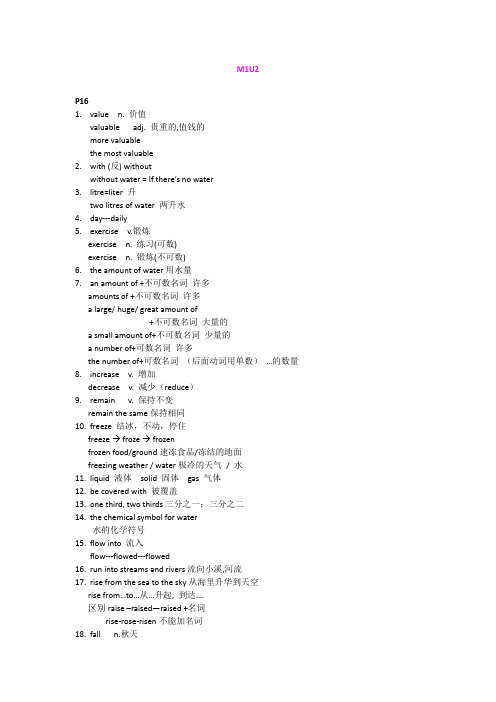
M1U2P161.value n. 价值valuable adj. 贵重的,值钱的more valuablethe most valuable2.with (反) withoutwithout water = If there’s no water3.litre=liter 升two litres of water 两升水4.day---daily5.exercise v.锻炼exercise n. 练习(可数)exercise n. 锻炼(不可数)6.the amount of water用水量7.an amount of +不可数名词许多amounts of +不可数名词许多a large/ huge/ great amount of+不可数名词大量的a small amount of+不可数名词少量的a number of+可数名词许多the number of+可数名词(后面动词用单数)…的数量8.increase v. 增加decrease v. 减少(reduce)9.remain v. 保持不变remain the same保持相同10.freeze 结冰,不动,停住freeze → froze → frozenfrozen food/ground速冻食品/冻结的地面freezing weather / water极冷的天气/ 水11.liquid 液体solid 固体gas 气体12.be covered with 被覆盖13.one third, two thirds三分之一;三分之二14.the chemical symbol for water水的化学符号15.flow into 流入flow---flowed---flowed16.run into streams and rivers流向小溪,河流17.rise from the sea to the sky从海里升华到天空rise from…to…从…升起, 到达….区别raise –raised—raised +名词rise-rose-risen不能加名词18.fall n.秋天fall-fell-fallen v. 落下fall asleep入睡feel sleepy感到困倦fall from the clouds as rain作为雨从云朵里降落下来P171.in the bathroom在浴室2.brush her teeth刷她的牙齿3.be on/off 开着的/ 关着的4.pour into the washbasin 倒入洗脸盆5.vanish down the drain沿着下水道流下去不见了vanish (近) disappear(反) appear 出现6.say loudly大声地说7.turn on打开turn off 关掉turn up 开大turn down 关小turn that tap off = turn off that tap关水龙头turn it off8.look around / round 环顾四周9.waste water 浪费水10.sound impatient 听起来不耐烦的feel, look, sound, smell, tastepatient n. 病人patient adj. 耐心的impatient adj. 不耐烦的patiently adv. 耐心地impatiently adv. 不耐心地patience n.耐心impatience n.不耐心11.obey-obeyed-obeyed 遵守obey = follow(反) disobey 违反12.a drop of water 一滴水drop n. 一滴v. 使降落,降低drop---dropped---dropped13.It is + adj. (for / of sb.) to do…It is + adj + that …It’s kind of you to help me.It’s important for us to save water.14.Do you know where I’m from?你知道我是来自哪的吗?15.float comfortably舒服地漂浮comfort → comfortable → comfortably→uncomfortable. → uncomfortably16.enjoy the view 欣赏风景view n. 视线, 风景, 观点in my view 在我看来17.drop me into a stream使我掉进了小溪里drop…into…把…抛入…18.speed (speed-sped-sped)speed down the mountain沿着山坡快速下滑19.the Yangtze River 长江the Huangpu River 黄浦江20.carry me to a lake 把我带到一个湖泊carry sb. to sp.21.travel a long way长途跋涉22.relax v.放松, 休息relaxation n.23.run into the Huangpu River流入黄浦江24.clean up 净化get cleaned up 被净化了25.It’s time to d o …It’s time for …是做…的时候了26.sound puzzled 听起来感到困惑的puzzle v. 使迷惑/使困惑puzzling adj. 令人困惑的27.a water treatment works 一家水处理厂treat v. 对待, 治疗work n. 工作(不可数) works n. 工厂28.give sb. a thorough cleaning给某人做一次彻底的清洗thorough=completethoroughly adv. 彻底地clean adj. 干净的v. 净化, 清洁cleaning n 打扫29.travel in the pipes under the street在街道下面的管道里流淌30.add a few chemicals to me往我身上加了一些化学物质add A to B 把A加入B31.the end of your journey 你旅程的终点32.finish with用完33.a sewage plant = a sewage works 一家污水处理厂34.延续动词+ until…瞬间动词+ not until…35.pump…into…把…抽到…36.remember (not) to do 记住(不)去做某事remember doing 记得曾经做过某事forget to do 忘记去做某事forget doing 忘记曾经做过某事37.be back in the sea返回到海洋38.wait a minute等一下39.What do you mean by sth./ doing…?你的意思是…?40.be like liquid gold像液体黄金41.no reply = no answer没有回音e out of the bathroom从浴室里出来43.talk to对某人说话talk with和某人说话talk about谈论44.strange = weird 奇怪的P181.fall down下降2.go up上升3.be able to do能够做某事4.be unable to do不能够做某事5.in a comfortable way以一种舒适的方式P20-221.uncountable nouns不可数名词2.plural countable nouns可数名词的复数3. a lot of= lots of + 可数/不可数5.plenty of + 可数/不可数6.enough + 可数/不可数7.some, any, no, none+ 可数/不可数许多大量的足够的8. a few / several + 可数a little + 不可数9. few + 可数little + 不可数一些几乎没有10. not manynot much `不是太多11. too many / muchtoo few / little 太多太少12. a ( large / great ) number of +a number of +可数a large / huge /small amount ofan amount of+ 不可数a great deal of + 不可数可数+ 不可数13. only / quite / still/ just +a few/a little14. too / so / very + few / little15. fry some prawns for dinner为晚餐煎虾16. look at his recipe看他的菜单17. the amounts of the ingredients原料的数量18. red peeper红椒19. tomato sauce番茄酱20. cooking oil食用油21. gram 克kilogram 千克P231. a one- yuan coin一枚一元的硬币2.pocket money 零用钱3.rather dirty 相当脏P251.in charge of掌管2.represent 代表3.ordinary people 普通人4.restaurant owners 餐馆老板5.hospital managers医院经理6.factory owners工厂老板7.equipment n. 设备equip v. 装备8.need water for doing…需要水做…9.save water节约水P261.make flow charts制作一个流程图2.step by step 一步接一步P271.ocean water海水2.that is to say那就是说3.be drinkable可以饮用的4.human beings人类5.pollute groundwater污染地下水6.motor oil机油7.drinking water饮用水8.fill up a coffee cup装满一咖啡杯9.have to do不得不…10.leave the water running让水一直流11.believe it or not信不信由你12.flush down our toilet冲洗马桶13.at least 5 minutes至少5分钟14.even more water甚至更多的水15.easily use容易地使用16.more easily the most easily17.it does not matter没关系18.a dripping tap一个滴水的龙头。
上海牛津沪教版八年级(下)同步讲义unit2
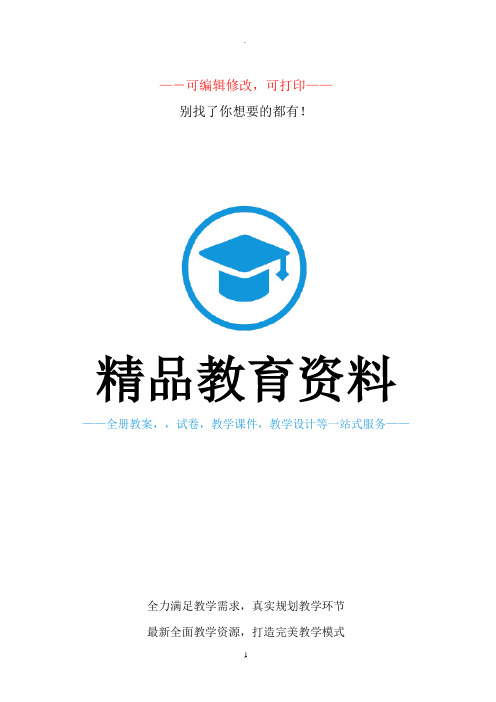
—-可编辑修改,可打印——别找了你想要的都有!精品教育资料——全册教案,,试卷,教学课件,教学设计等一站式服务——全力满足教学需求,真实规划教学环节最新全面教学资源,打造完美教学模式第二讲Unit2 Water上海牛津沪教版八年级(下)同步讲义Unit2 Water适用学科初中英语适用年级初中二年级适用区域上海课时时长(分钟)120分钟(一对一)知识点知识点1:本单元词汇知识点2:词组知识点3:句型知识点4:过去进行时知识点5:不定式的用法知识点6:定语从句教学目标知识:学生能够基本掌握8年级上册Unit2中的词汇、词组、句型及语法。
方法:牢记各个知识点的用法,归纳总结异同点,通过习题加强巩固。
能力:熟练掌握各种词汇的用法;具备准确判断词性及转换的能力;熟练掌握过去进行时时态;熟练掌握不定式的用法;熟练掌握定语从句;教学重点词性转换;不定式的用法;定语从句;教学难点不定式的用法教学过程一、课堂导入教师讲述一个与本节课题目有关的英文小故事,引出今日所要讲解的知识点,然后让学生简单梳理一下所涉及的问题,带着问题学习本节课的内容。
二、复习预习教师引导学生复习上节课学的重点内容,检测单词的用法,(以提问、回顾的形式进行),针对上节课的作业进行讲评、订正、答疑,并通过英文小故事导入本节课所要学习的新知识。
三、知识讲解1. 知识点一:重点单词1)daily [ˈdeɪli]【词性】adv.【词义】每天【经典例句】Your body needs about two litres of water daily.你的身体每天需要两升左右的水。
2)amount [əˈmaʊnt]【词性】n.【词义】数量;数额【易混淆点】an amount of 大量的,修饰不可数名词a number of 大量的,修饰可数名词【经典例句】When you exercise, the amount of water you need increase.当你锻炼的时候,你身体需要水的量就增加了。
1.1 本册综合 同步素材 (牛津译林版八年级下册)
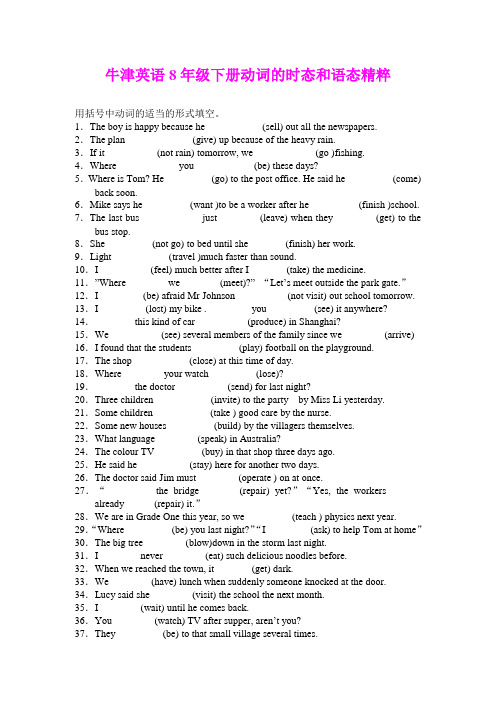
牛津英语8年级下册动词的时态和语态精粹用括号中动词的适当的形式填空。
1.The boy is happy because he ___________(sell) out all the newspapers.2.The plan _____________(give) up because of the heavy rain.3.If it __________(not rain) tomorrow, we ____________(go )fishing.4.Where ____________you____________(be) these days?5.Where is Tom? He _________(go) to the post office. He said he _________(come) back soon.6.Mike says he _________(want )to be a worker after he _________ (finish )school. 7.The last bus ____________just ________(leave) when they ________(get) to the bus stop.8.She _________(not go) to bed until she _______(finish) her work.9.Light ___________(travel )much faster than sound.10.I __________(feel) much better after I _______(take) the medicine.11.”Where ________we________(meet)?”“Let’s meet outside the park gate.”12.I_________(be) afraid Mr Johnson __________(not visit) out school tomorrow. 13.I _________(lost) my bike ._________you _________(see) it anywhere?14.________this kind of car __________(produce) in Shanghai?15.We __________(see) several members of the family since we ________(arrive) 16.I found that the students _________(play) football on the playground.17.The shop ___________(close) at this time of day.18.Where ________your watch _________(lose)?19.________the doctor __________(send) for last night?20.Three children ___________(invite) to the party by Miss Li yesterday. 21.Some children ___________(take ) good care by the nurse.22.Some new houses _________(build) by the villagers themselves.23.What language ________(speak) in Australia?24.The colour TV _________(buy) in that shop three days ago.25.He said he __________(stay) here for another two days.26.The doctor said Jim must ________(operate ) on at once.27.“__________the bridge _______(repair) yet?”“Yes, the workers_______ already______(repair) it.”28.We are in Grade One this year, so we _________(teach ) physics next year. 29.“Where _________(be) you last night?”“I_________(ask) to help Tom at home”30.The big tree ________(blow)down in the storm last night.31.I________ never ________(eat) such delicious noodles before.32.When we reached the town, it _______(get) dark.33.We ________(have) lunch when suddenly someone knocked at the door. 34.Lucy said she ________(visit) the school the next month.35.I ________(wait) until he comes back.36.You ________(watch) TV after supper, aren’t you?37.They _________(be) to that small village several times.38.If it _________(snow) tomorrow , we won’t go to the cinema.39.I (study) it since I was ten years old.40.Could you tell me if you _________(read) the story book before?41.He said the lights in the room _________(go) out when he opened the door. 42.I _________(be) fifteen soon.43.Tom, your aunt _______(come) this afternoon .44.My teacher often _________(tell) us not to play on the street.45.They________(plant) trees on the hill. Do you see?46.The teacher said that the earth ________(move) round the sun.47.She said she _______(put) on a new coat the next day.48.The Great Wall _________(know) all over the world.49.Could you tell me where Alice ________ (live)?50.________the film ______(show) many times since last Sunday.51.________the street lights usually _______(turn) on at seven in summer evening? 52.I _______(not go) to the cinema because I ________(see) the film before. 53.It ________(get) dark. What about ________(go) home at once?54.You ________(be) late if you __________(not hurry).55.Use your head and you _________(find) a better way.56.Look!Someone ________(lie) on the floor.57.It __________(rain) harder now. It ________(rain) quite often in summer. 58.Here _______(come) the bus.59.I don’t know when the manager ________(return), but when be _________(come) back I _________(let) you know.60.“Where ________(be) you this time yesterday?”“I________(be) at home. I _______(go) over my lessons then.”答案1.has sold 2.will be given up/ has been given up 3.doesn’t rain, will go 4.have, been 5.has gone, would come 6.wants, finishes 7.had, left, got 8.won’t go, finishes 9.travels 10.felt, had taken 11.shall/will, meet 12.am, won’t visit13.have lost, Have seen 14.is, produced 15.Have seen, arrived 16.were playing 17.is closed 18.was, lost/ has been lost 19.was, sent 20.were invited21.are taken 22.have been built 23.is spoken 24.was bought25.would stay 26.be operated 27.has, been repaired, have repaired28.will be taught 29.were ,was asked, 30.was blown 31.have, eaten32.got/ had got 33.were having 34.would visit 35.will wait36.are watching 37.have been 38.snows 39.have studied 40.have read 41.had been gone 42.will be/ am 43.will come 44.tells45.are planting 46.moves 47.would put 48.is known 49.lives50.has, been shown 51.are, turned 52.won’t go, have seen53.gets, going 54.will be, don’t hurry 55.will find 56.is lying57.is raining/ rains, rains 58.comes 59.will return, comes, will let60.were, was, was going。
- 1、下载文档前请自行甄别文档内容的完整性,平台不提供额外的编辑、内容补充、找答案等附加服务。
- 2、"仅部分预览"的文档,不可在线预览部分如存在完整性等问题,可反馈申请退款(可完整预览的文档不适用该条件!)。
- 3、如文档侵犯您的权益,请联系客服反馈,我们会尽快为您处理(人工客服工作时间:9:00-18:30)。
Unit 1 Nature and EnvironmentP 11. in the ground 在地里=on the ground2. become a pear tree 变成一棵苹果树become + 名词短语3. strange adj.奇怪的stranger n.陌生人4.an apple seed/ tree 一粒/棵苹果种子/树P21.the living things 生物2.the average age/ height/ weight平均年龄/ 身高/ 体重3.on the right/left 在右/左边4.mouse n. mice pl.5.human n. humans pl.German(s) Roman(s)6.make things dirty and unhealthy使事物变脏和不健康make + n / + adj./ sb do sth7.health n. 比较级:healthier-healthiestunhealthy a. healthy (反) health n.7.magnolia trees 白玉兰树8.noise pollution 噪音污染pollution n. pollute v. . polluted a.9.sweet-smelling flowers 芳香宜人的花10.city flowers of Shanghai 上海市花11.pollution fighters 环保战士fight v. ---fought----foughteful products 有用的产品produce v.生产13.natural air conditioners 天然的空调nature n.自然14.pass information to one another 相互传递信息pass sth. to sb. = pass sb. sth. 把某物传给某人pass v. past prep.cross v. across prep.15.science n. 科学scientist n. 科学家P31.pollution fighter 环保战士fight v. 战斗,打架fight-fought-fought fighter n. 战士2. collect some facts for a class project on pollution 收集一些关于污染的班级课题的材料fact n. 事实in fact 事实上collect v. collection n.3. interview sb. about sth. 关于某事采访某人4.be interested in sth/doing sth. 对……感兴趣= be keen onshow interest in sth.5. living things 活着的事物live v. -> alive 存活的(表语)living adj. 活着的(定语)life n. -> lives (pl)6. on the Earth 在地球上7. what good 什么好处good adj. 好的good n. 好处What good are trees?= What’s the good of trees?8. make streets more beautiful and less noisy 使得街道更美丽并降低噪音make sth/ sb + adj. 使某人/某物怎么样make sb ( not )do sth. 使得某人做某事make sth for sb= make sb sth 为某人做某物9.noise n. noisy a. noisier(比) noisily ad.10. what else 还有呢11.on the end of your pencil 在你铅笔的末端in the end = at last = finally = eventually 最后at the end of the street 在街道的尽头by the end of sth 到…为止e/ be from 来自13.breathe pure, cool air 呼吸纯净凉爽的空气breathe v. breath n.out of breath 气喘吁吁breathe v. breath n.14. of course = certainly15.thank sb. for sth./doing sth.因某事而感谢某人16. take harmful gas es from the air 从空气中吸收各种有毒气体take A from B17. harm v/n.harmful adj. harmless adj.18. release oxygen back into the air 向空气中释放氧气release = let out= give off19. one and a half hectares of trees=one hectare and a half of trees1.5公顷的树20. produce enough oxygen 提供足够的氧气21. produce v. 生产,提供product n. 产品,产物production n. 生产22. keep sb alive and healthy让某人健康存活keep sb/sth + adj. 保证某人/某物怎么样23. for a whole year 整个一年24. That’s wonderful. 太神奇了。
25.cool the air 使空气降温26..…as well as…=both…and…=not only…but also… = and= and…, as well不但…而且…as well as 和…一样好 e.g:He draws as well as I .27.natural air conditioners 天然的空调air conditioner n. air-conditioned a.natural a. nature n.28.do the job of 起…作用do the job of 15 air-conditioners running almost all day相当于15台一整天连续工作的空调的工作量29.almost all day 几乎全天30.know a lot about trees 了解很多关于树木的知识31.warn sb of sth. 警告某人做某事warn sb (not) to do sth . 警告某人不要做某事warning n.32.protect themselves by producing a chemical 通过分泌一种化学物质来保护他们自己protect sb/oneself by doing sth. 通过做某事来保护某人33.chemical n. 化学物质a. 化学的, chemical change 化学变化chemistry n. chemistry teacher/ lesson/lab 化学老师/ 课/实验室chemist n. 药剂师34. make leaves taste nasty 使叶子品尝起来很苦涩make sb do sth35. join the roots together 根系交织在一起join A and B togetherjoin= connect36.underground n. 地铁underground adv. 在地下under the ground prep. 在地下37. pass food and water to each other 相互传递养料和水分38. communicate with sb. 和某人沟通、交流communication n.39.be in (great)danger 处于(极度)险境中danger n. dangerous adj.be out of danger 脱离危险40. for example 举例子41. cut down 砍下42.replace hardly any of trees 几乎不种树replace = take the place of sth43. hardly any = almost no= almost none (of)44. fighters against pollution环保的卫士P41. suppose →think it is true or possilbe2. pure →clean3. release →let out4. running →working5. communicating with exchange information with6. hardly any →almost none7. made by nature 天然制造的made by man人造的8. make mistakes 犯错P6-71.phone/ call sb 打电话给某人make phone calls to sb2.on holiday with sb 和某人度假3.sunbathe v.sunbath n.4.practise doing 练习做…5.windsurf 冲浪go windsurfing6.dive into the sea 跳水P8-91. a poster about tree-planting 一张关于种植的海报2.take part in a tree-planting campaign 参加一个种植活动3.seven reasons for planting more trees7个种更多树的理由4.put rubbish in rubbish bins 往垃圾筒里丢垃圾5.plastic bags for shopping 塑料购物袋6.in order of importance 以重要性的顺序排列P10.1. a newspaper article on a new outdoor area一篇关于一个新室外场地的新闻报道2.dig holes in the ground ( dug , dug , digging ) 在地上挖洞3. in a lorry 坐卡车P111.work hard for sb 尽力为某人服务2.reduce sound pollution 减少污染3.add beauty to cities 给城市增加美add A to B4. be washed away 被冲走5. provide food and shelter for both humans and animals 为人类和动物提供食物和住所6. supply material for houses, furniture and paper products 提供材料来建造房屋,制作家具和纸制品7.cure illnesses 治病8.in the last / past two hundred years 在过去的二百年中9.make a difference 区别10.remove / get rid of dust除掉灰尘11. warmly welcome 热烈欢迎warm adj. warmly adv.12. in the next 10 years 在将来的10年内13.send sb an e-mail at…往某人的什么邮箱发邮件14.have lots of fun with us 与我们有很多乐趣P121.go outdoors 去室外2.in prison 入狱3.go to the beach去海滩4.live in the countryside 住在乡下5.breathe fresh air 呼吸新鲜空气6.sit in the front row 坐在前排7.lie on the beach 躺在海滩上8.come to the phone= answer the phone 接电话9.have a shower 淋浴。
